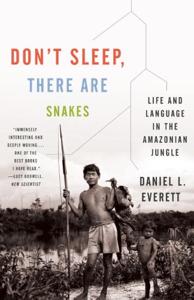
Want to learn the ideas in Don’t Sleep, There Are Snakes better than ever? Read the world’s #1 book summary of Don’t Sleep, There Are Snakes by Daniel L. Everet here.
Read a brief 1-Page Summary or watch video summaries curated by our expert team. Note: this book guide is not affiliated with or endorsed by the publisher or author, and we always encourage you to purchase and read the full book.
Video Summaries of Don’t Sleep, There Are Snakes
We’ve scoured the Internet for the very best videos on Don’t Sleep, There Are Snakes, from high-quality videos summaries to interviews or commentary by Daniel L. Everet.
1-Page Summary of Don’t Sleep, There Are Snakes
Overview
Can you imagine what it would be like if you didn’t have numbers, or words to describe colors? It would change the way that you interact with your surroundings. If there were six white pigeons in a dovecot, would they still be ‘six’ and not by their color? We might think this is an odd thought experiment, but for the Pirahã tribe members living deep in the Amazonian jungle; this is just how things are. This book isn’t patronizing about how these people are different from us Westerners; rather it’s a fascinating account of their language and how it’s vastly different from anything we’re accustomed to. We will also see how their language shapes and is shaped by its use of words.
In this passage, you’ll learn that the Pirahã are not afraid of snakes because they say “don’t sleep, there are snakes” to each other. You will also learn how the ending of words indicates whether a statement is true or false in their language. Finally, you’ll learn why it’s important to preserve endangered languages like the Pirahã language and study them.
Big Idea #1: The Pirahã live in the Amazonian jungle and speak a language unrelated to any other extant language.
We use language to define the world around us. Imagine a culture that doesn’t have words for worry, as it’s not part of their vocabulary. This is true of the Pirahã (pronounced pee-da-HAN). They live in Brazil and are hunter-gatherers who don’t see the world through our same lens. The Pirahã language is one of just a few remaining languages from the Mura group, which makes it unique and interesting to linguists like Dan Everett, an American missionary who spent years living with them before taking his findings on tour across Europe.
The Pirahã, a tribe of people in the Amazonian rainforest, are monolingual. They probably moved to that area after their language developed. We’re confident of this because they use Portuguese loanwords to describe some of the native species of monkeys. It’s not an easy life in the jungle – it’s a very tough environment for these people to live in. However, they also happen to be among the happiest people you’ll ever meet and have been assessed by anthropologists as being happier than any other culture they’ve encountered before (based on how much time they spend laughing). The worldviews of these people can be best summarized by one way that they wish each other good night: “don’t sleep; there are snakes.”
There are poisonous snakes in the Amazonian jungle, and this is a way of saying that if you don’t keep your wits about you, you won’t last long. Also, it shows us how they treat sleep; they may not sleep the whole night through but neither do they lie awake paralyzed by fear. Late-night conversations can be heard in the open huts and laughter regularly punctuates the air – signs of their way of life.
Big Idea #2: The Pirahã don’t use numbers and have no form of counting as we know it.
While living with the Pirahã, Daniel Everett received his supplies every eight weeks. However, they were constantly amazed that he could know when the supply plane would arrive.
The Pirahã people were interesting to the linguist because they did not have a system of counting. Instead, they used comparative words like “bigger” or “smaller.” Two fish would be considered bigger than one fish, and one larger fish would be considered bigger than a minnow.
The Pirahã also have no concept of counting, which Everett found fascinating. They don’t use numbers, and they can’t count to ten. When Everett asked them how many children they had, for example, he was told that they didn’t know because their children were all still alive.





